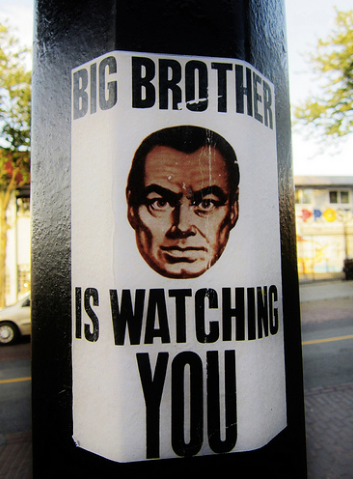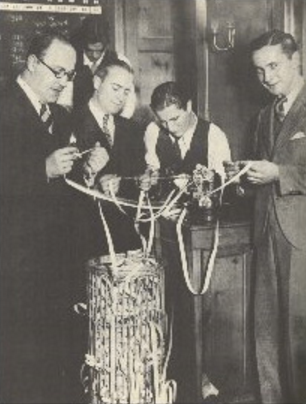Blockchain Technology for Beginners: Chapter One (from "Blockchain Revolution")
There are a lot of smart people on Steemit. Many of them have deep knowledge of how blockchain technology works. That can make us mere mortals feel like we are completely incompetent, and would be better off staying away from this site.
I am one of those people. But I'm fascinated with what I've tried to understand so far. So, if you are like me, I'm going to try and break down everything I learn into plain English. I'm doing this by dissecting chapter-by-chapter of Don and Alex Tapscott's book, Blockchain Revolution: How the Technology Behind Bitcoin Is Changing Money, Business, and the World.
My motto in life is: Keep It Simple, Stupid! (or, KISS, for short). So, without further adieu, let's dive in.
The Problem of Trust
The main problem with the way our economy runs now is that there are tons of middlemen, all taking a cut of our transactions, and collecting tons of data about us in the process. This includes, "banks, governments, PayPal, Uber, Apple, and Google," to name a few.
Why are we willing to give up this money and privacy? Because there's no way we can reliable trust our transactions to be secure without them. How would you feel about sending money in an envelope to an unknown computer company in China, in hopes that you'd get a laptop back in three weeks?
By relying on all transactions to go through these intermediaries, most of us gain a level of trust.
The Solution: Blockchain Technology, A Global Ledger
Even the word "ledger" can turn people off to understanding blockchain technology. I prefer, "the total history of each unit of currency."
Imagine if every single dollar in your wallet was a person. You could pull them out, and spread them on your table. "Tell me about everywhere you've been," you could ask your money. The first ten dollar bill says:
"I started out at a bank, but pretty quickly I was rolled up and sent off to buy cocaine. After that, the drug dealer used me to buy drinks at a club. The owner of the club used me to buy a hot dog at a baseball game. And when you got change for your beer at the same game, I went into your wallet."
In a way, that's what blockchain technology accomplishes.
In the simplest way I know (and I'm sure I'll miss important details here and hopefully be corrected in the comments section), here's how that is accomplished:
- Distributed: The ledger--or history of your currency--is distributed. Instead of existing on one computer database in one government building, the total history of each unit of currency is part of a database that's hosted on thousands of computers throughout the world, which are updated on a regular basis.
- Public: Because of this distributed structure, all of the history of each unit of currency is out there for the world to see.
- Encrypted: I'll let the Tapscotts tackle this one. "If you wanted to steal a bitcoin, you'd have to rewrite the coin's entire history on the blockchain in broad daylight. That's practically impossible."
So when it's time to make a purchase--using, say, a bitcoin--the blockchain on that unit has to match the blockchain that's in every other database on the network. Thus, it is approved "by consensus." It's like how when someone passes away, the next of kin is brought in to make sure that the person is who they say it is.
What does blockchain give us that the status quo doesn't?
Let's imagine that you give money to a non-profit. Sometimes, this money is squandered, and you never know what happened to "your money." With blockchain technology, you'd have a much better idea.
- Honesty: Many say that honesty in business disappeared when we transitioned from mom-and-pop stores to multinational corporations. When mom-and-pops ran a business, they knew that everyone in town talked to everyone else, and if they weren't honest, word would get around quickly. Blockchain, with its un-erasable history of transactions, restores this...but at a much larger scale.
- Consideration: To be honest, I think the author's did a pretty bad job of explaining this, so I'm skipping it.
- Accountability: Again, when transactions--and other things like contracts--are held in an un-erasable blockchain ("story that can't be forgotten"), then you can be held accountable for all past decisions in the blockchain.
- Transparency: This is obvious, see above.
You could easily find out exactly what happens to your money--you just need to follow the blockchain of your unit of currency that you donated.
(the story just keeps going, and going, and going...)
There are also two other things that blockchain offers that I'd be remiss to skip: (1) it allows many outside of the global financial system (think African farmer) enter the system, so long as they have Internet connectivity, and (2) it can be used for non-monetary uses. It could help keep a record of property rights, employment history, birth records, or even reviews of job performance.
Who gets disrupted?
- Aggregators in the "sharing economy": Airbnb, Lyft, Uber, TaskRabbit. These guys build a platform, take a cut of every transaction, and also aggregate data. If true peer-to-peer transactions take place via blockchain, "a cooperative owned by its members" could replace it.
- Money-transfer companies: Moneygram and Western Union count on 7% in fees to boost their bottom line. Blockchain currency could be transferred for 2% or less. That's a huge deal for immigrants sending money back to family.
- Corrupt Governments or Foreign Aid organizations: Like the example above showed, you can track exactly where your money goes. Accountability becomes much more intense.
In general, "rent collectors" are getting the boot, and actual content creators get to reap the rewards of their work.
The risks...
There was an entire section on this, but I'll let one quote from technology theorist David Ticoll sum it up:
"Many of us did a bad job predicting the full impact of the Internet. ISIS type bad phenomenon are among what we missed, and some big 0ptimistic predictions turned out wrong. If the blockchain is as big and universal as the Net, we are likely to do a comparably bad job of predicting both its upsides and downside."
So, on the most basic levels, what did I miss? Sound off below!!!
Chapter Two coming later this week....




This post has been linked to from another place on Steem.
About linkback bot. Please upvote if you like the bot and want to support its development.
Hi @antifragile, I thought I'd stop back and let you know that of the more than 30 posts I read today, yours was one of my favourite reads. I've shared that with others here https://steemit.com/life/@shadowspub/tuesday-ramble-through-steemit-my-favourite-reads-sept-6th
Be looking for you to post on the rest of the book as you read through
@shadowspub - Many thanks. I appreciate the feedback. Next one will be up soon.